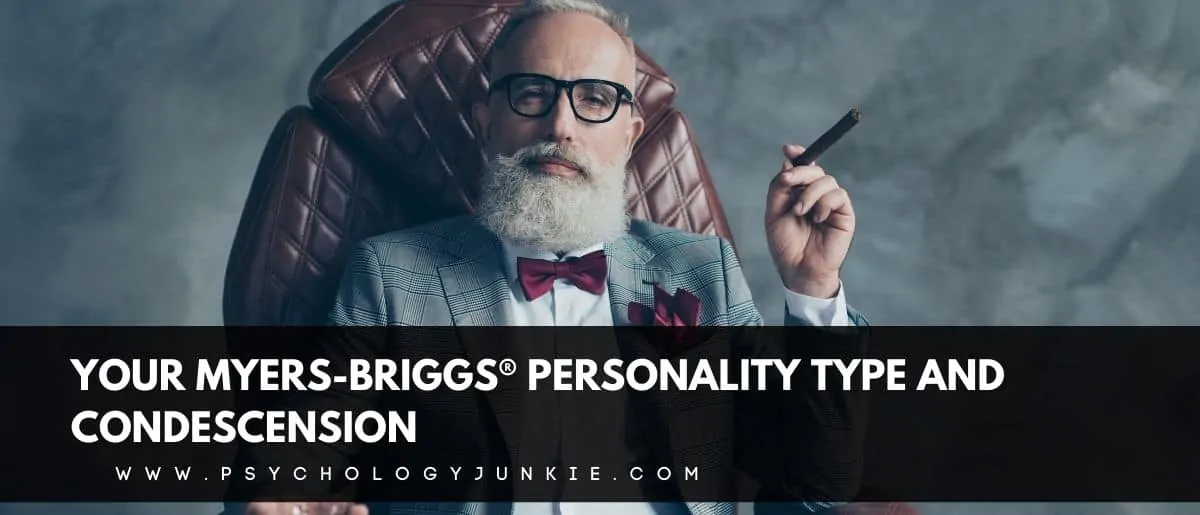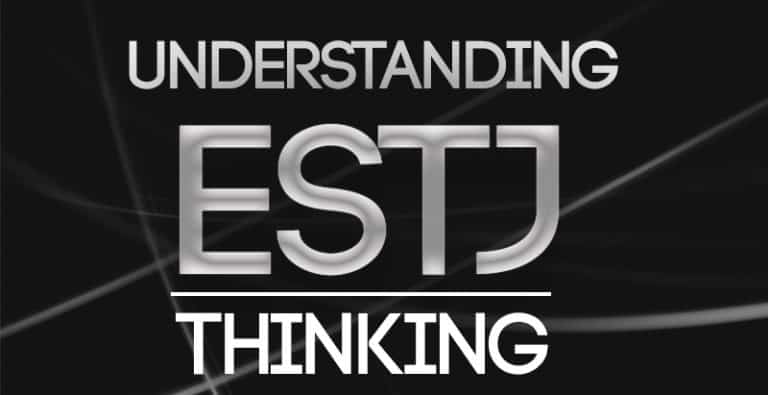Your Myers-Briggs® Personality Type and Condescension
Do you ever feel like the people around you keep talking down to you rather than respecting your perspective? Sometimes people are condescending intentionally. Other times, people get condescending without even realizing they are doing so. This is especially true when it comes to contrasting personality types. Understanding how we might be inadvertently condescending to other types can help us to stop this bad habit.
Why and How Are We Condescending to Other Types?
Each of us is wired to understand and perceive the world through a unique lens. For example, INFJs perceive the world through Introverted Intuition and make decisions by analyzing information through Extraverted Feeling. This means that when someone comes along who perceives the world through Introverted Sensation and Extraverted Thinking they might naturally feel uncertain or skeptical. This same dynamic applies to each of the 16 personality types in the Myers-Briggs system. When we see a situation through one particular lens and another person comes along looking through a different lens, all we can think is, “Don’t they realize how much they’re missing?” and we don’t even realize we might be missing a whole different perspective as well.

You May Have Grown Past Condescension
If you’re reading this and not connecting, chances are you’ve grown past this point in your life or you’re not identifying with the correct personality type. Many people mature past these moments of condescension. They may only relate to these descriptions if they look back at their childhood!
Not sure what your personality type is? Take our new personality questionnaire here. Or you can take the official MBTI® here.
The Myers-Briggs® Personality Types and Condescension
ENFPs and Condescension
ENFPs don’t walk into the room thinking they’re better than you. But if you walk in quoting rules, policies, or the phrase “that’s just how it’s always been,” prepare to be met with polite skepticism—or outright dismissal. ENFPs are allergic to rigidity. Try to confine them to your box of rules and they’ll mentally swan-dive out the nearest window. Their condescension isn’t mean-spirited—it’s more of a head tilt and a mental, “Wow, you’re really gonna die on that hill, huh?”
What can make an ENFP condescending?
-
Rigid rule-following with no room for experimentation
-
People who value tradition over imagination
-
Overly cautious types who suck the fun out of everything
-
Being talked down to by someone who confuses skepticism for wisdom
-
Lack of emotional authenticity
Read This Next: 24 Signs That You’re an ENFP, the “Visionary” Personality Type
ENTPs and Condescension
ENTPs are idea gladiators. They live to question, experiment, and poke holes in your best-laid plans—not because they’re mean, but because they want to know what’s real. Their curiosity is bottomless, and their patience for close-minded thinking is thinner than dental floss. If you repeat something outdated, untested, or (God forbid) sentimental, they’ll pounce. You’ll get the smile, the nod, and then the intellectual takedown that starts with “I’m just playing devil’s advocate…” They don’t even realize they sound condescending half the time—they’re just out here testing hypotheses like mad scientists with charm and no chill.
What can make an ENTP condescending?
-
Dogmatic thinking or black-and-white worldviews
-
People who focus on details but ignore the big picture
-
Rule-followers who refuse to question systems
-
Sentimental arguments without logic to back them up
-
Being told to “stick to the plan”
INFPs and Condescension
INFPs will never outright sneer at you. But they will write a passive-aggressive poem about you in their journal. This type is driven by ideals, meaning, and emotional truth. So when someone tosses out advice rooted in convention, popularity, or cold logic, the INFP’s soul throws up a little. They’re not trying to be snobs—they’re just allergic to superficiality. If you try to “fix” them with generic life advice or act like success = status, they might gift you with a tight-lipped smile and an internal monologue that sounds like: “Wow. So you really think that’s deep, huh?”
What can make an INFP condescending?
-
People who follow the crowd with no self-reflection
-
Emotionally shallow conversations or clichés
-
Enforcing external systems on them “for their own good”
-
Trying to correct them with logic when they’re in a feeling space
-
Dismissing their inner world as impractical or naive
Read This Next: 24 Signs That You’re an INFP, the “Dreamer” Personality Type
INTPs and Condescension
Curious and analytical, INTPs try to keep an open mind towards people. But, as Walter Kotschnig once said, “Let us keep our minds open, by all means, as long as that means keeping our sense of perspective and seeking an understanding of the forces which mould the world. But don’t keep your minds so open that your brain falls out!”
These types are at their best in the abstract, analytical realm of ideas. They’re internal debaters, questioning every assumption, including their own. But if you come at them with emotional appeals, fluffy platitudes, or inflexible thinking, they’ll quietly file you under “Not a Reliable Source.” Their condescension is subtle—dry, measured, and deeply cutting if you notice it. They don’t mean to make you feel dumb. But if you say something illogical and they raise one eyebrow while muttering “Interesting,” that’s the intellectual equivalent of getting roasted.
What can make an INTP condescending?
-
Emotional reasoning with no supporting logic
-
People who follow tradition without asking why
-
Shallow small talk with no deeper exploration
-
Being expected to “go with the flow” when the flow makes no sense
-
Instructions that prioritize “how it’s always been done” over effectiveness
Read This Next: 24 Signs That You’re an INTP, the “Prodigy” Personality Type
ENFJs and Condescension
ENFJs are the motivational speakers of the personality world—charismatic, passionate, and eager to pull others toward their highest potential. But sometimes that inspirational glow comes with a side of “I know what you need better than you do.” These types have a sixth sense for where you’re headed (or should be headed) and can get a little preachy when you’re dragging your feet. They mean well—truly—but their advice can come out like a TED Talk nobody asked for. They’re not trying to steamroll you… they just want you to stop self-sabotaging already.
What can make an ENFJ condescending?
-
People who reject emotional nuance or empathy
-
Resistance to growth or change
-
Ignoring the impact of decisions on others
-
Cold logic with no consideration of feelings
-
People who disrupt group harmony for the sake of being “real”
Read This Next: 24 Signs That You’re an ENFJ, the “Mentor” Personality Type
ENTJs and Condescension
ENTJs are efficiency incarnate. They don’t have time for nonsense—and if you make them repeat themselves, you become nonsense. These types have big visions and an even bigger drive to execute them. If you slow them down with hesitation, indecision, or “trusting your gut,” expect a deep sigh and a thinly veiled lecture. Their condescension isn’t petty—it’s practical. If they think you’re incapable, they’ll just take the wheel. They’re not trying to insult you—they just assume you’d rather not waste both your time and theirs by fumbling around. (They may be correct.)
What can make an ENTJ condescending?
-
Indecisiveness or procrastination
-
Emotional reasoning without strategic value
-
Poor time management
-
Lack of ambition or vision
-
Excessive rule-following without results
INFJs and Condescension
INFJs don’t mean to judge you. They’re just over here having existential crises in three dimensions while you’re talking about brunch plans. These types live in the realm of patterns, foresight, and meaning—so when someone fixates on surface-level concerns or short-term goals, the INFJ might start mentally glazing over. And if you brush off their insights? Oh boy. Cue the internal monologue: “I could explain, but it would take too long and you probably wouldn’t get it anyway.” Their condescension is quiet but potent. A pause. A blink. A change of subject that implies, “Let’s move on to something that matters.”
What can make an INFJ condescending?
-
Shallow or overly practical conversations with no depth
-
People who resist long-term thinking or dismiss intuitive hunches
-
Overemphasis on materialism or status
-
Surface-level socializing without authenticity
-
Having their insights brushed off as “too intense”
Read This Next: 24 Signs That You’re an INFJ, the “Mystic” Personality Type
INTJs and Condescension
INTJs aren’t trying to make you feel small. They just genuinely believe their plan is better than yours—and they’re usually right. These types are future-focused strategists with an allergy to small-minded thinking. If you come in with emotional logic, vague goals, or no plan at all, the INTJ will blink slowly and start internally rewriting your entire life. Their condescension doesn’t show up in snark—it shows up in complete disinterest. They disengage. They mentally log you as “not serious” and pivot to something more worthwhile. If you’re lucky, they’ll explain. If not, you’ll just get ghosted at a soul level.
What can make an INTJ condescending?
-
Poor planning or lack of long-term vision
-
People who rely on charm instead of competence
-
Overly emotional decision-making
-
Groupthink, especially when it’s inefficient
-
Being interrupted mid-thought with something frivolous
Read This Next: 24 Signs That You’re an INTJ, the “Strategist” Personality Type
ESFPs and Condescension
ESFPs are all about seizing the day and taking action… and they’ll absolutely side-eye you if you show up like a wet blanket. These types live for excitement, connection, and authenticity. If you walk in quoting data and trying to start an intellectual debate, they’ll mentally check out and start scanning the room for someone with a pulse. ESFPs don’t tolerate pretense well. If you act superior or hyper-intellectual, they’ll assume you’re compensating for a personality deficit and smile at you like you’re a confused toddler. Their condescension usually shows up as charm laced with quiet judgment—and a slow backing away.
What can make an ESFP condescending?
-
People who overanalyze instead of experiencing
-
Emotional repression or trying to act “above it all”
-
Pretentiousness or intellectual arrogance
-
Killing the vibe with rigid routines
-
Being dismissed as “just fun” when they know they’re more
ESTPs and Condescension
ESTPs are wired for action. They crave speed, relevance, and results. If you walk into a conversation with a 17-step theoretical framework, they’ll give you about 10 seconds before tuning out and mentally test-driving a motorcycle. ESTPs are all about “can it work now?” and if your ideas sound like they were brewed in an ivory tower by someone who’s never changed a tire, expect skepticism—followed by dry humor. Their condescension is often playful, but it carries an unmistakable vibe of “You talk. I do.”
What can make an ESTP condescending?
-
People who theorize endlessly but never act
-
Overcomplicated plans with no real-world testing
-
Emotional dramatics that interrupt problem-solving
-
Know-it-alls with no practical experience
-
Being underestimated or micromanaged
ISFPs and Condescension
ISFPs are the quiet rebels—chill on the outside, but deeply principled underneath. They value authenticity over almost everything, and if you come at them with fake energy, pushy advice, or unsolicited life coaching, they’ll silently pull away while judging your soul. They’re not loud about their disapproval. They just slowly erase you from their mental guest list. ISFP condescension looks like passive resistance, emotionally detached politeness, or the kind of soft-spoken sarcasm that takes you five hours to realize was a burn.
What can make an ISFP condescending?
-
Pushy people who try to “fix” or mold them
-
Public praise that feels performative or manipulative
-
People who conform just to be liked
-
Overplanning or micromanagement
-
Anyone who dismisses art, nature, or beauty as “frivolous”
Read This Next: 24 Signs That You’re an ISFP, the “Virtuoso” Personality Type
ISTPs and Condescension
ISTPs don’t waste energy on drama. If someone annoys them, they don’t engage—they disappear (physically or mentally). These types are hands-on problem solvers who value efficiency and independence. They don’t respond well to emotional pressure or philosophical rambling. If you start waxing poetic about your “soul purpose” while they’re trying to fix a leaking pipe, they’ll look at you like you’re speaking in dolphin. Their condescension isn’t loud—it’s a vibe. A pause. A dry, short reply. Or no reply at all.
What can make an ISTP condescending?
-
People who lead with feelings instead of facts
-
Emotional oversharing with no actionable point
-
Abstract or convoluted discussions
-
People who demand constant engagement or validation
-
Incompetence paired with arrogance
ESFJs and Condescension
ESFJs are the type to remember your birthday, your dog’s favorite toy, and that time in 7th grade you cried over a spelling bee. They care deeply—but if you threaten everyone’s harmony or show up with chaotic energy and zero accountability, they’ll start using their warmth like a weapon. Their condescension is sugar-coated, but trust—there’s judgment under the frosting. They’ll offer help you didn’t ask for, in a tone that says, “You clearly can’t handle this on your own.” It’s motherly concern with just enough side-eye to sting.
What can make an ESFJ condescending?
-
Disrupting the social atmosphere with self-absorbed behavior
-
Refusing to pull your weight in a group
-
Acting emotionally detached or cold
-
Prioritizing abstract ideas over real people’s feelings
-
Flouting norms just to be edgy or different
ESTJs and Condescension
ESTJs have things to do, and they need you to either help or get out of the way. These are people who see inefficiency as a personal insult. If you show up late, unprepared, or casually winging it? They’ll mentally fire you—even if you’re not on their team. Their condescension isn’t subtle—it’s usually delivered with blunt feedback and a look that says “How do you survive like this?” ESTJs value action, decisiveness, and results. Waffling around in your feelings while they’re building Rome? Yeah, no.
What can make an ESTJ condescending?
-
Indecision, procrastination, or disorganization
-
People who prioritize vibes over results
-
Talking in circles without making a point
-
Excuses disguised as “personal truths”
-
Lack of accountability or initiative
Read This Next: 24 Signs That You’re an ESTJ, the “Captain” Personality Type
ISFJs and Condescension
ISFJs are kind, conscientious, and wildly underrated in their ability to hold a grudge over you leaving crumbs on the counter again. They’re not flashy about their judgment, but it’s there—quietly brewing like tea left too long in the pot. They’ve worked hard to create a harmonious, stable environment, and if you come along treating that like background noise, you might get a smile so tight it squeaks. They don’t want to embarrass you—but they will correct you with a tone that says, “I expected better.”
What can make an ISFJ condescending?
-
Disregarding their routines, traditions, or space
-
Being thoughtless about details they always manage
-
People who act superior while contributing nothing
-
Dismissing emotional needs as irrational
-
Making messes—literal or emotional—and expecting no consequences
ISTJs and Condescension
ISTJs are human user manuals. They know the steps. They’ve followed the rules. And if you waltz in improvising or cutting corners, expect the emotional equivalent of a red pen. They’re not showy—they just know what works, and they don’t appreciate when people make the same mistakes they’ve already learned from and tried to warn you about. Their condescension comes out through curt corrections, heavy sighs, and the deadly phrase: “We’ve always done it this way for a reason.”
What can make an ISTJ condescending?
-
Disorganization or failure to plan ahead
-
People who ignore proven methods or standards
-
Overly emotional reasoning that bypasses facts
-
Disrespect for tradition or hard-earned structure
-
Lack of follow-through or personal responsibility
Read This Next: 24 Signs That You’re an ISTJ, the “Detective” Personality Type
What Are Your Thoughts?
Did you enjoy this article? Do you have any insights or suggestions to share? Let us know in the comments!
Find out more about your personality type in our eBooks, Discovering You: Unlocking the Power of Personality Type, The INFJ – Understanding the Mystic, The INFP – Understanding the Dreamer, and The INTJ – Understanding the Strategist. You can also connect with me via Facebook, Instagram, or Twitter!










So the next question is: how do you not be condescending according to type?
I think just being awware of the problem is a big start 🙂 Realizing that we’re all wired differently and all have different strengths and weaknesses can stop a lot of condescension right there!